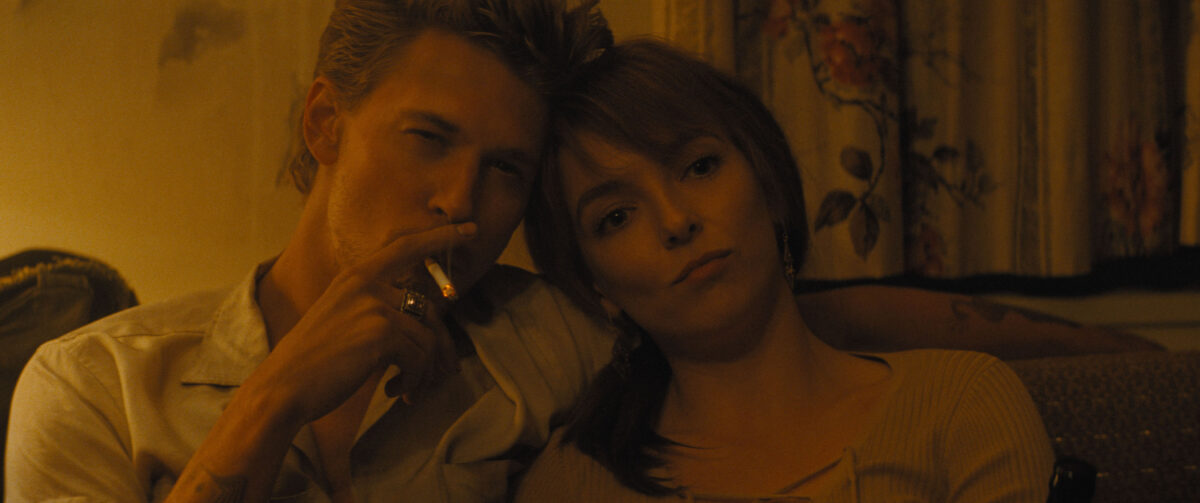
Americans have always been a little obsessed with the mythology of the motorcycle. From The Wild Ones to Easy Riders to The Sons of Anarchy, pop culture has teemed with images of cool guys zooming on the back of giant hogs, usually Harleys. And that mythology is apparently self-perpetuating.
Early in The Bikeriders, the new film about a Chicago bike gang in the late ’60s, we see truck driver Johnny (Tom Hardy) watching The Wild Ones on TV at home with his wife. He chuckles approvingly when Brando’s Johnny, asked what he’s rebelling against, replies, “Whatya got?”—and he repeats the line out loud, imitating Brando’s shrugging swagger. He decides to become the leader of a motorcycle “club” (he never calls it a gang) of his own.
They call themselves The Vandals and are fond of wearing leather jackets (or open denim or leather vests), heavy boots, and bandanas tied like headbands, but never helmets. Defying, or even courting, death is part of the allure for these guys. The leather jackets have The Vandals logo on the back (referred to as “colors” by the members) and a patch with a hand giving the finger on the front. Whatya got?
The Bikeriders takes place in the late ’60s and early ’70s, a transitional time in American culture. In the beginning, Johnny and his crew look like greasers, the sort we might associate with The Lords of Flatbush. Eventually, as their ranks grow, the hair gets longer, the beards scruffier, and the drug of choice shifts from beer and whiskey to marijuana. Johnny, who has an increasingly antiquated code of honor, risks being left behind.
The film is based on Danny Lyon’s striking, elegiac photobook of the same title and Mike Faist, who’s suddenly everywhere these days (not complaining!), plays the Danny character here, conducting interviews with the bikers and their girls, and lurking on the outskirts of the action, taking photos.
Director Jeff Nichols absolutely brings the book to life, capturing not just the style, machismo, and scuzziness of these disenfranchised men, but their primal need to be a part of something larger than themselves and the hint of melancholy that lurks just beneath their bravado.
The film starts with a wonderful burst of Scorsese-like brio. Young Benny (Austin Butler) is at a bar, wearing his colors. We find out that the other Vandals don’t wear their colors when they’re not all together because they fear getting jumped or arrested or worse. Benny has no such fear. When a couple of regulars tell him to take his jacket off, he says, “You’d have to kill me to get this jacket off”—an invitation to violence if ever I’ve heard one. And violence is what he gets. It seems to follow Benny around.
We learn about Benny from Kathy (Jodie Comer), the woman who will eventually become his wife—and who serves as our primary narrator. Comer, the British actress who shot to fame after her role as a captivating contract killer in Killing Eve, is great here. Her Kathy is a tragi-comic figure, filled with wry and humorous observations about the boys and their rituals, always delivered with a thick Chicago accent, while desperate to get Benny to give up the lifestyle.
The Bikeriders is set up as a battle for Benny’s soul, with Johnny, who sees his younger counterpart as a natural successor, facing off against Kathy, who sees the path Benny is on and just wants him to live.
But the biggest problem with The Bikeriders, I’m afraid, is Benny himself. Not so much Butler’s performance—his leonine handsomeness is used to great affect here—but the character, as written. We see from the very start that Benny is kind of a sociopath—refusing to take off that jacket, smiling in the face of violence, always the first to throw a punch. Even his romantic streak is a little suspect: He woos Kathy by standing outside her house until he scares away her boyfriend and makes himself at home.
If anything, it’s Johnny, played with Brando-esque mumbly gravitas by Hardy, who earns our respect. When a fellow member dies, he brings The Vandals to line up in a somber, military-style procession outside the funeral home. He doesn’t blink when the mother of his fallen brother spits on him.
The relationship between Benny and Kathy is also undercooked. We see very little of their marriage, beyond her pleading with him to give up the gang. She’s attracted to him, sure—when she first spots him, he’s leaning over a pool table at a bar, from which he rises, smolderingly. (Butler is shot with the kind of appreciative gaze generally reserved for women.) But what else?
To the film’s credit, Kathy is not depicted as a nag, but rather someone smart enough to see that things will end badly. The threat of violence and death hangs over these men—and the film—at all times. And yet, she’s the only female character that gets any kind of interior life. This film is a boy’s club in every sense of the phrase.
The Bikeriders is beautifully shot and acted but it has a bit of a screenplay problem. It traffics in mythology more than characters. I didn’t really care about Benny and Kathy as a couple because I didn’t feel like I real knew them. But man, they do look good on the back of a motorcycle.
